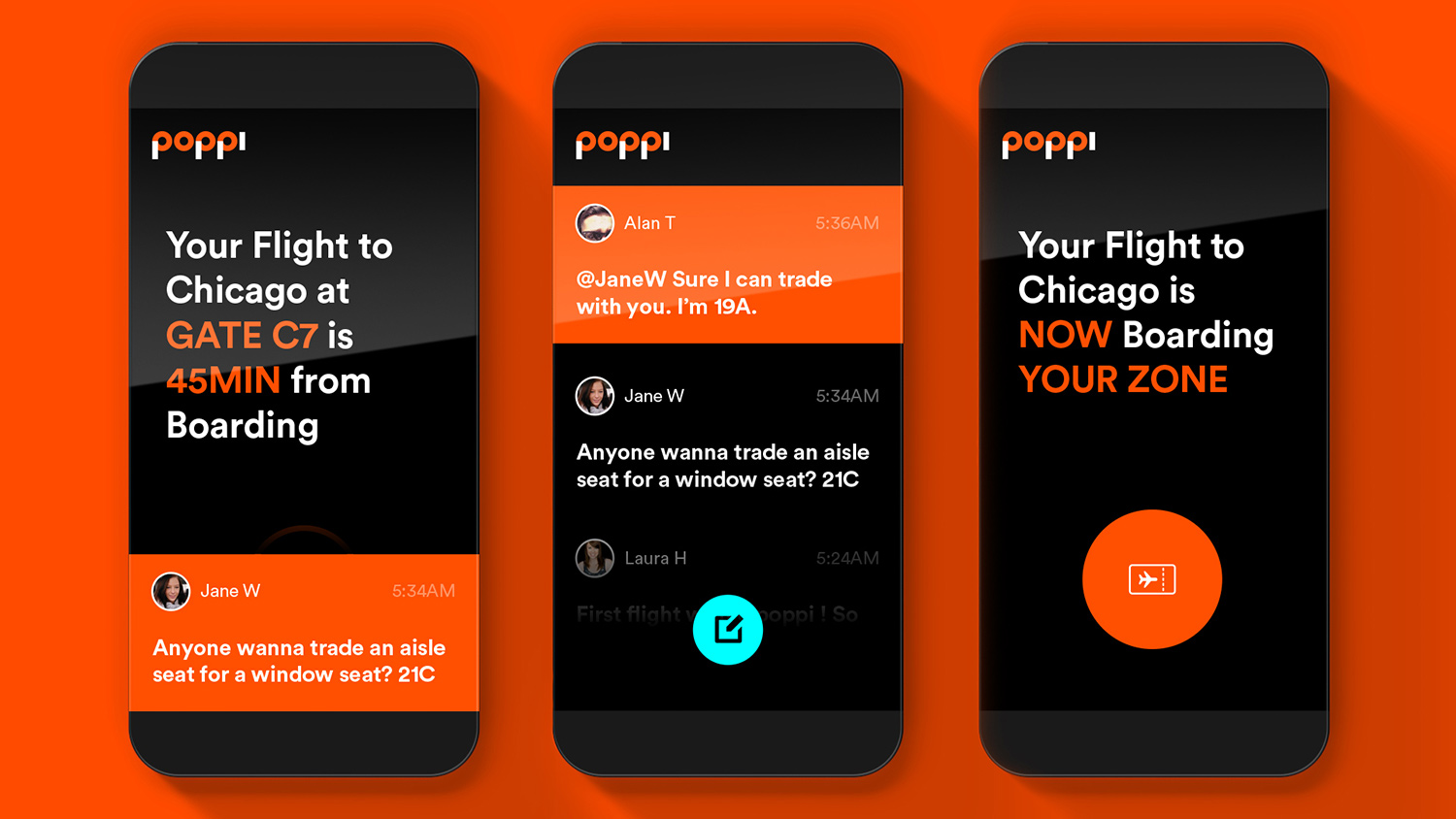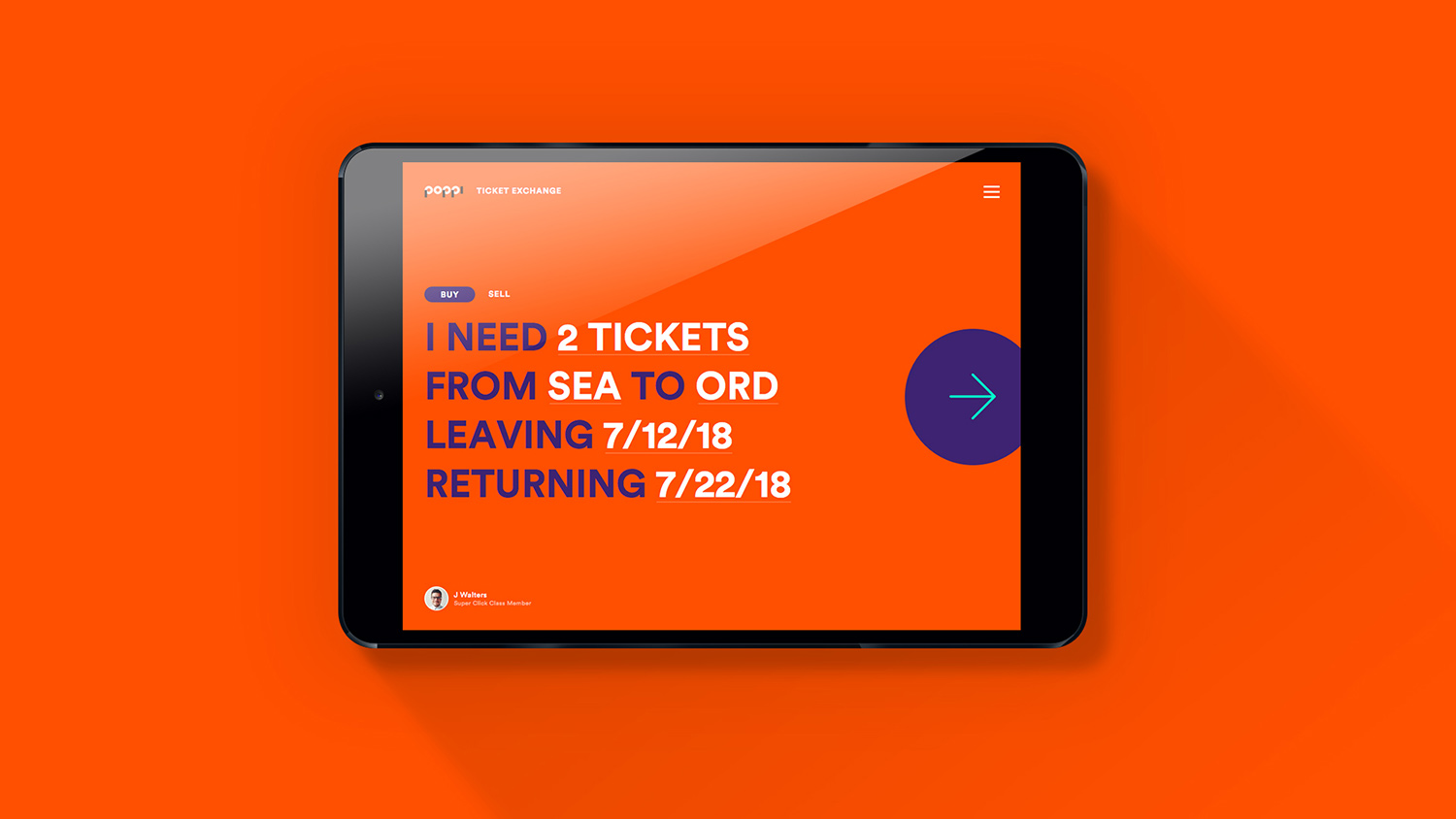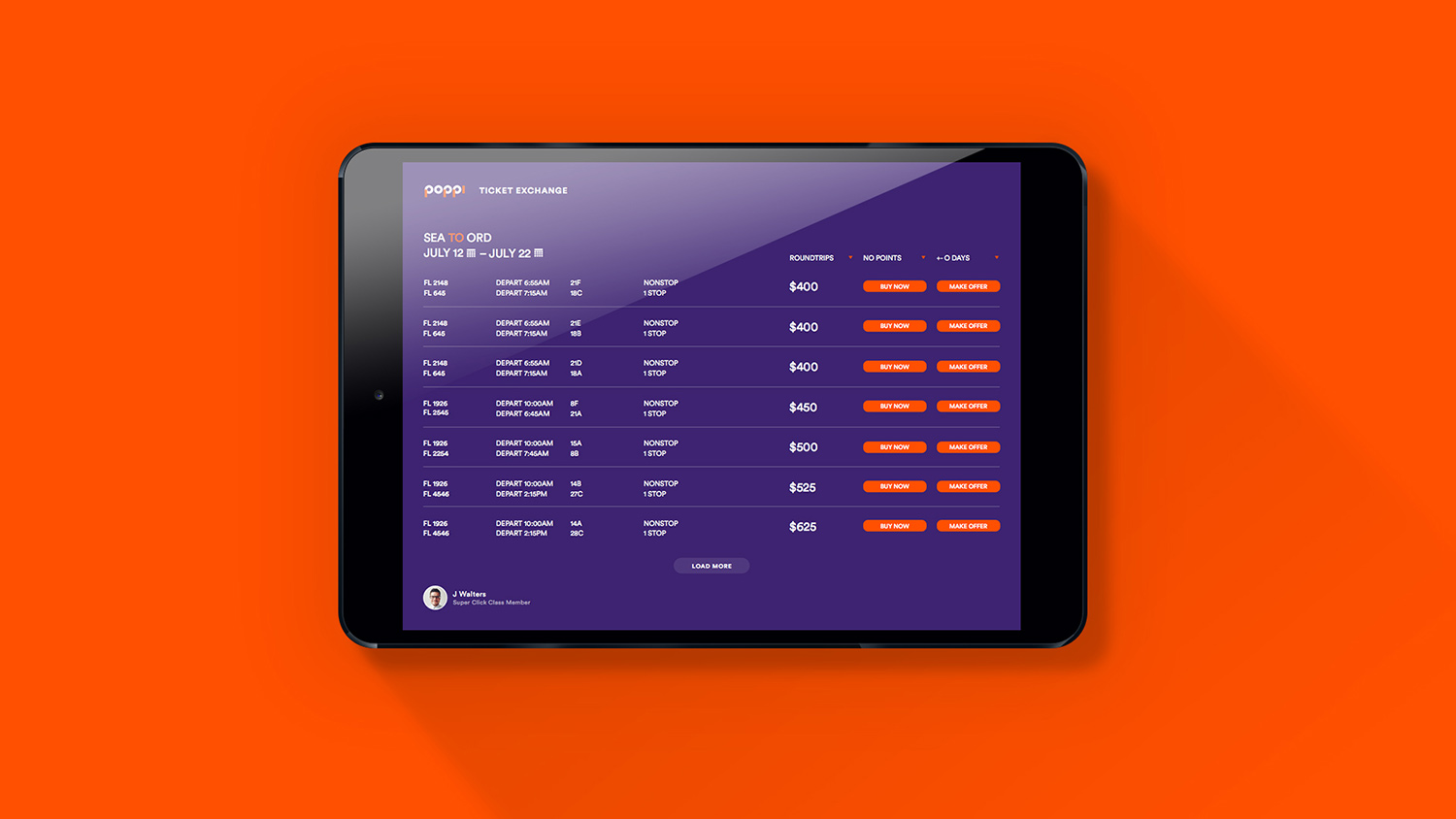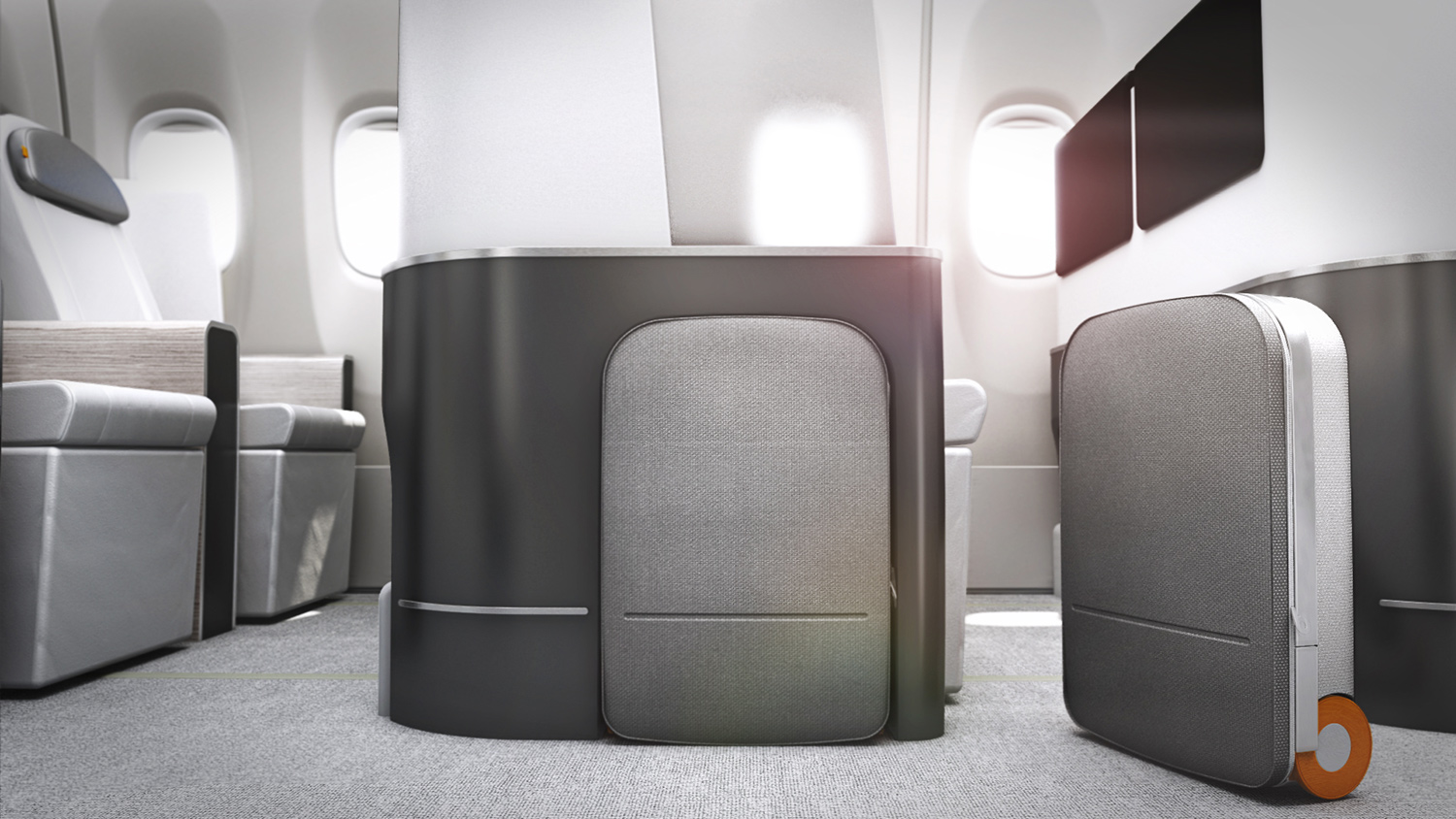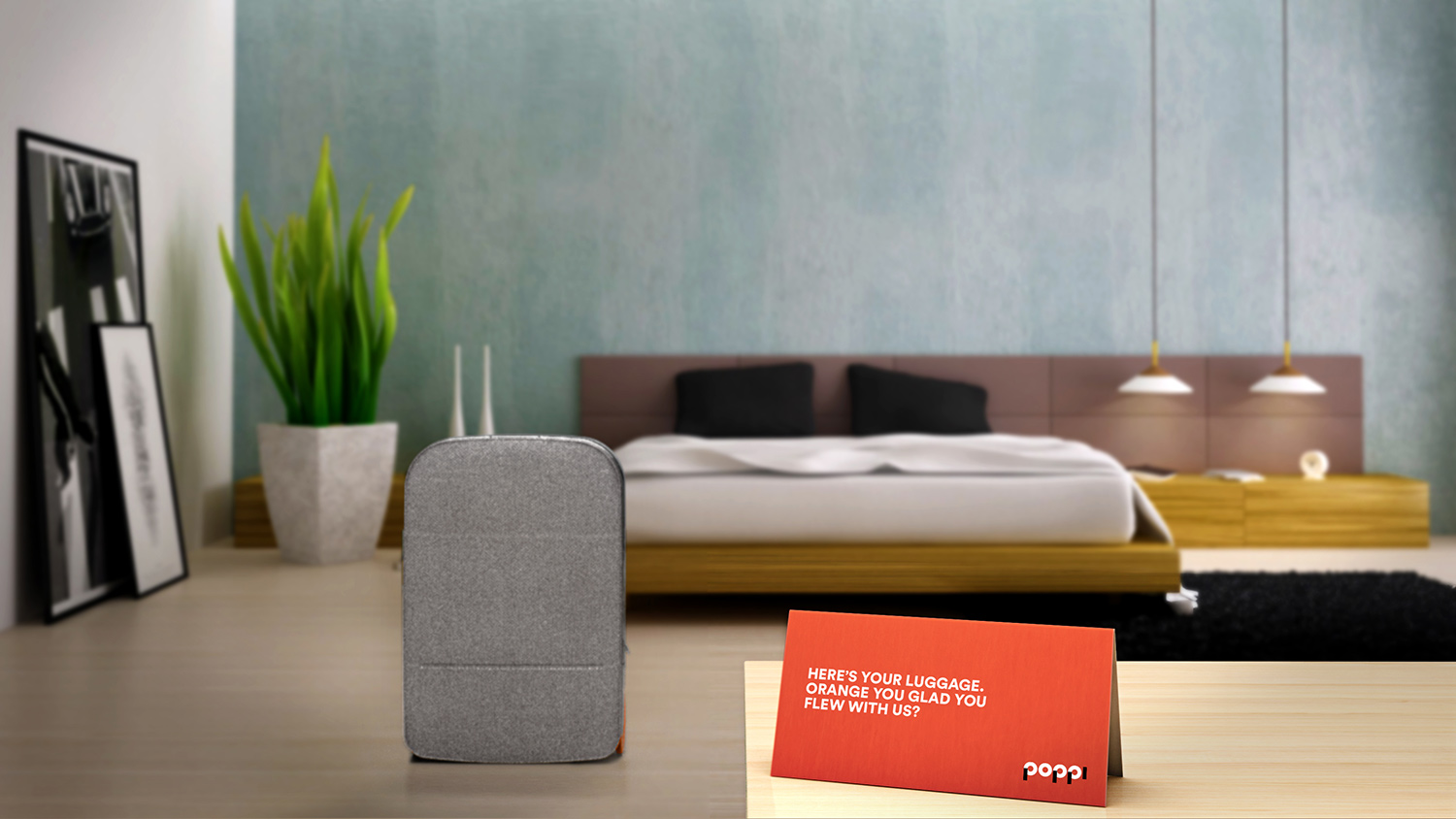Airlines are constantly reinventing themselves, but new paint jobs, logos, and ever-more perks for the 1-percent up front don’t address the headaches of air travel. What if there was a startup airline, modeled after the likes of Uber and Airbnb, that truly disrupts the status quo of flying?
There is, and it’s called Poppi.
Before you try to book a ticket, you should know Poppi doesn’t exist. It’s a concept developed by one of the world’s top design agencies, Teague, and introduced at the recent Airline Passenger Experience Association (APEX) Expo in Portland, Oregon. The firm looked at the annoyances passengers face and other things that are backward about the industry, and created an airline concept that addresses the needs of today’s flyers, rather than following established practices. But Poppi is also a wake-up call for many airlines, particularly the legacy carriers.
“We we wanted a name that was bright and exuberant, and also tech-forward.”
“We set out to create a concept for a cohesive, belief-driven startup airline that would inspire existing airlines to anticipate future innovations and start replicating those innovations today,” says Devin Liddell, Teague’s Principal Brand Strategist. “To be blunt, there are big parts of the airline business model and airline practices that deserve reinvention.”
Compared to the taxi and hotel industries that Uber and Airbnb disrupted, the airline business isn’t as easy to break into, so many airlines, perhaps, haven’t felt the need to revolutionize their “conventional thinking” practices. Even customer favorites like JetBlue and Virgin America, while highly innovative, still follow industry standards. But Teague says existing airlines are facing more and more dissatisfied passengers with the way things are evolving, and it’s time to implement “disruptive innovations” into their operations – before a real startup truly turns the business upside-down.
“What if the taxi cab industry could’ve seen Uber coming?” Liddell says. “Would they have changed the way they do dispatch and payment? I think they would have.”
The good guys
Not all airlines are doing things wrong. “We have a ton of respect for airlines like Southwest, which is clearly not afraid to go against the grain of conventional thinking,” Teague’s Devin Liddell says. “Air New Zealand does an awesome job of imagining and then implementing new products. Delta, even for how big it is, is also not afraid to explore new ideas and try new things, and I think that’s starting to show up in their passenger experience. And then I’d include airlines like Emirates and Cathay Pacific because they have total clarity about their reason for being, and that clarity counts for a lot in terms of an airline’s ability to offer a great experience.”
Technology will play a big role. In fact, the name Poppi, which was chosen because it doesn’t fit with existing naming constructs, Liddell says, has a tech reference.
“We modified the word ‘Poppy,’ which we think of as a very bright and brave flower, by changing the ‘Y’ to an ‘I’ at the end,” Liddell says. “And the reason we did this was then all the letters can be formed with a one or a zero – the name can be formed through a bit string of code. And that’s deliberate, because we fervently believe that the airline of the future will need to be a software company on some level, to be very fluent in how it uses code to solve problems, and create fantastic experiences.
“We we wanted a name that was bright and exuberant, and also tech-forward,” Liddell adds.
Creative agencies are constantly developing design exercises, like Poppi, to explore how good practices can benefit society (check out Teague’s Nike plane concept). Often they are radical, but Poppi presents ideas that can be easily introduced. In fact, Teague says some of the ideas already exists, and are being trialed by various airlines.
Unlike outrageous hardware solutions like Airbus’ patent for “stacked seating,” Poppi’s approach is to change the perceptions of air travel. Interestingly, Liddell says, from Teague’s research, many passengers actually want changes, like minimal carry-ons, to take place, but it’s airlines themselves that have a harder time grasping disruptive concepts.
“The way (new) ideas will be accepted is by introducing them to passengers in real life, and then having those passengers experience their benefits first-hand,” Liddell says. “Then they’ll tell their family and friends, ‘Wow, this was really different and I love it.’ I know that sounds simplistic, but we know from years and years of brand research that it’s the way the world works. Plus, we’ve already heard from many, many passengers and their feedback is very clear: They want these new ways of doing things.
While design concepts usually remain on paper, Teague has a long history in air travel, working with Boeing since the early days of modern air travel and developing cabins for Air Canada, Aeromexico, and Emirates.
“We obviously share a lot of this thinking directly with our partners at Boeing and also with airlines,” Liddell says. “So I think it’s less about marketing this concept than just having hard-working conversations about how to make these ideas real so that passengers and airlines can start benefitting from them.”
While Poppi may not exist, some of its concepts could shake up your next flight … in a good way.
Next page: What’s in store
No luggage, please

Poppi has a simple carry-on policy: no luggage. In the cabin, traditional overhead bins are replaced with “fedora bins,” which have just enough room for personal items, like laptop bags and jackets. Plus, it creates an open feeling throughout the cabin.
The policy solves a few problems. Since nearly all airlines charge a baggage fee, many passengers have been carrying them on instead. This slows down the boarding process, and, if overhead compartments are full and the airline has to check them for free, it angers those who paid. Smaller bins even the playing field, and it helps with on-time departures and quicker de-boarding of planes.
“You’ll hear industry insiders claim with total confidence that passengers want their carry-ons onboard,” Liddell says. “But when you listen to passengers, that’s not what they want. What they want is transparency and assurance that their bag is where it’s supposed to be, and they want a way to get their bag back in a way that’s better than a spinning carousel. And, they don’t want to pay a bag fee – which is really just a fine for doing business with an airline – and that’s why they bring their bags onboard.”
RFID baggage tags

If everyone is required to check his or her luggage, Poppi needs to ensure bags end up in passengers’ hands upon arrival. Poppi uses RFID tags to track where bags are at all times, and Poppi’s mobile app notifies you when it’s ready for pick-up.
“A lot of the tech within Poppi is not futuristic at all,” Liddell says. “The fact that RFID and NFC bag tags are not more widespread is a bit crazy considering that the technology is entirely available. Qantas has had an awesome reusable RFID bag tags (created by Apple design consultant, the renowned Marc Newson) in service since 2010. And yet, airlines continue to spend literally millions of dollars a year on thermal paper.
A middle seat you’ll fight for

As if flying coach isn’t already grueling, getting stuck in a middle seat is like grinding salt in the wound. Poppi’s middle seats are actually valuable: Partnering with prized brands, passengers in these seats get something extra. Passengers won’t only want to book these seats, they may even pay more for them.
Flexibility
While airlines are creating cabin fares with rigid policies, Poppi has taken a page from tech companies like StubHub. You may not be able to get a refund, but what if you could list your flight on a marketplace and resell it? Or trade your prized middle seat with someone who has a window seat, so you can get some sleep? Poppi’s approach demonstrates that you can still run a lean and very profitable business model without entrapping your passengers.
“In our research phase, we noted that six of the ten largest sports leagues in the world operate their own ticket resale platforms,” Liddell says. “And the big reason they built and operate these platforms is that it generates additional revenue and serves fans better. So this is an obvious direction for airlines.”
Loyalty program that actually rewards

Membership programs like Starbucks Rewards and Amazon Prime have shown that companies can keep customers coming back simply by offering discounts and freebies to those who spend more, while adding significant profit. Current frequent-flier programs make it difficult to attain elite status, and the rewards they offer get slimmer every year. Poppi’s approach makes everyone an important member of a community (similar to what JetBlue and Virgin America do), allowing loyal fliers to pre-pay for flights and services similar to Starbucks Rewards, while rewarding them with tangible incentives – not miles that you can never redeem.
“Starbucks makes 8 percent of its annual profit on interest income, which is mostly thanks to the billions of dollars consumers pre-load onto its payment platforms, essentially pre-paying for coffee,” Liddell says, adding Amazon members spend more than 50 percent than non-members. “And then when you think about Uber and Airbnb, they are also models to borrow from, especially in regards to how they create a sense of belonging and community, which definitely does not exist for most modern airlines.”
Real-time info

Instead of waiting for gate agents to announce status or boarding, Poppi relies on a system that delivers real-time information to displays and mobile devices. When it’s your time to board, your smartphone or smartwatch pings you, so you don’t have to wait around the gate to hear if your row is boarding. With clear info on exactly who can board, Poppi also eliminates “gate lurking” – slyly boarding with a group that you don’t belong in. There’s also a social networking aspect to Poppi’s app: You may see notes from fellow passengers who are requesting to trade seats.
“Some of the functionality that we’re proposing with mobile apps will require airlines to be much more contextually aware of where passengers are within the travel experience, and for them to tailor interactions according to specific moments,” Liddell says. “That’s not happening today to the extent it will need to happen, but none of that is science fiction.”
First, business, or coach? Neither

Rather than dividing a plane based on price and elitism, Poppi’s classes are based on what passengers’ interests. For example, partnering with film studios, a “cinema class” would show exclusive movies, TV shows, or other content to those paying passengers.
Brand recognition

A hip and successful branding can do wonders for an airline (see JetBlue, Virgin). Poppi’s check-in counters, gate areas, mobile app, stationery, plates, and even merchandise are well designed, so much so that you’ll want to steal some to use at home. Its planes are also painted all-black, so there’s no misidentifying who you’re flying. We think Air New Zealand’s all-black planes are stunning, and it works here.
New business class
For its larger Boeing 777 planes, Poppi has reinvented business travel with the “click class.” Here, travelers would be able to bring on a custom-designed luggage that clicks into the seat. The idea here is that the business traveler needs to be on the move quickly, so she doesn’t need to wait for luggage, and can be easily stowed while onboard. Another added-value service Poppi offers is luggage delivery for its premium passengers.
“In the future, bags need to go to lots of places – specifically, straight to hotels and transit stations and homes and even Amazon lockers. But the last place they need to go is in (overhead compartments).”
